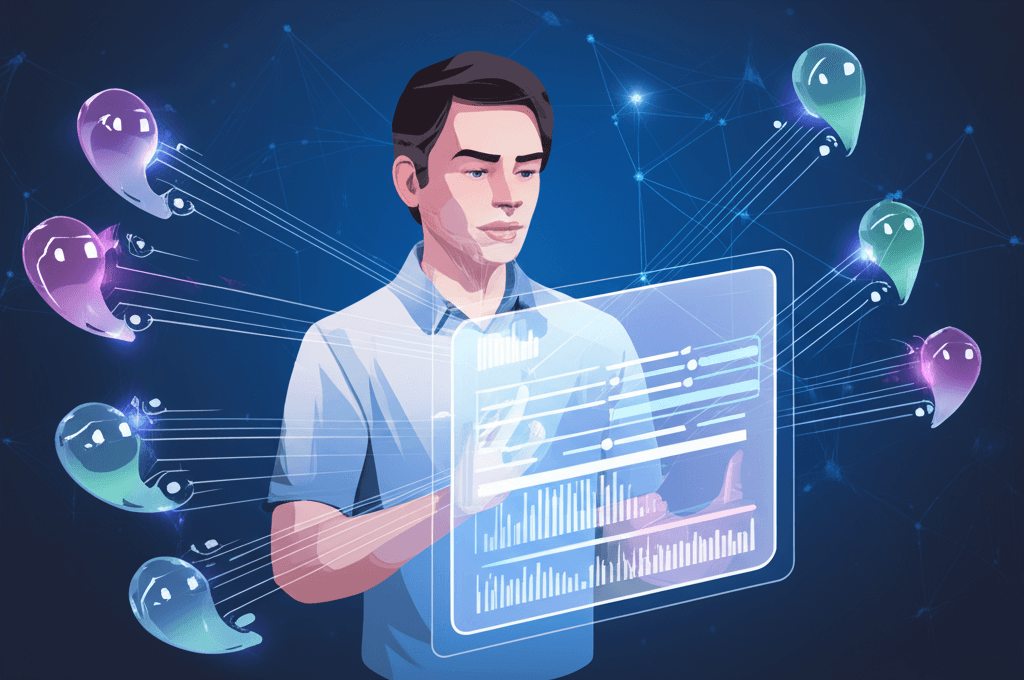GitHub Redefines Coding: Developers Orchestrate AI Agents via New Panel
Revolutionizing coding: GitHub's Agents Panel offers 'mission control' for delegating tasks to autonomous AI, boosting developer efficiency.
August 20, 2025

In a significant move to reshape the landscape of software development, GitHub has unveiled its new Agents Panel, a feature designed to function as a centralized "mission control center" for developers.[1][2] This new interface aims to streamline the interaction between developers and artificial intelligence, allowing for the seamless delegation of coding tasks to GitHub's Copilot agent from anywhere on the platform.[3][1] The introduction of the Agents Panel marks a pivotal step in the evolution of AI-powered development, moving beyond simple code completion to a more integrated and autonomous workflow. It provides a dedicated space for developers to assign, monitor, and manage background tasks without disrupting their creative process, signaling a future where human developers orchestrate a team of AI agents to build software more efficiently.[3][4] This development comes as AI agents are becoming an increasingly integral part of daily developer workflows, reflecting a broader industry trend toward more autonomous, AI-driven solutions.[4]
The Agents Panel is engineered to minimize friction and context switching, a common pain point for developers.[3] It manifests as a lightweight overlay accessible via a new button in the GitHub navigation bar, allowing users to interact with the Copilot coding agent without ever leaving their current page.[3][2] From this panel, a developer can describe a task in natural language, select the relevant repository, and assign it to Copilot.[3][4] The AI agent then takes over, working asynchronously in the background.[5] The panel provides a real-time status of all running tasks, giving developers a clear view of what the agent is working on and its progress.[3][1] Once the agent completes its work, which typically results in a finished pull request, the developer is notified and can seamlessly jump into the review process directly from the panel.[3][5] This entire process is designed to be non-intrusive, allowing developers to offload work and continue focusing on other complex problems while the AI handles the delegated task from start to finish.[2][5] The interface is also versatile, offering a full-screen view for managing multiple assignments at once.[4]
Powering this new mission control is the increasingly sophisticated GitHub Copilot coding agent.[6] This is not merely a chatbot or a code suggestion tool; it is an autonomous agent that operates in its own secure, cloud-based development environment powered by GitHub Actions.[3][7] This allows the agent to work in parallel on multiple tasks and continue its processes even if the developer's local machine is turned off.[3][4] When assigned a task, the agent evaluates the request, explores the repository's codebase, formulates a plan, drafts the necessary code changes, and can even run builds, tests, and linters to validate its own work before submitting it for human review.[3][6][7] This capability is enhanced by the Model Context Protocol (MCP), which gives Copilot read access to repository data and the ability to connect to other tools and services, further enriching its understanding of the project context.[3][2] The result is an AI collaborator that can independently handle low-to-medium complexity tasks such as implementing new features, fixing bugs, improving test coverage, or updating documentation.[6][7]
The introduction of the Agents Panel and the underlying Copilot coding agent represents a profound paradigm shift for the software development lifecycle and the AI industry at large. It moves the developer's role from that of a constant, hands-on coder to a high-level strategist and reviewer who delegates implementation details to a capable AI partner.[8][9] This shift promises significant productivity gains by automating the more tedious and time-consuming aspects of coding, freeing up human developers to concentrate on creative problem-solving, system architecture, and innovation.[10][9] The workflow fosters a new dynamic of human-AI collaboration, where developers remain in full control, defining goals and providing final approval, while the AI agent handles the iterative, and often laborious, steps of execution.[3][8] This model of delegating work to autonomous agents is seen as a blueprint for how agentic AI can be adopted across other white-collar professions, improving both efficiency and job satisfaction by allowing professionals to focus on higher-value work.[9]
In conclusion, GitHub's Agents Panel is more than just a new feature; it is a clear statement about the future of software development. By creating a central hub for managing AI agents, GitHub is solidifying Copilot's evolution from an AI pair programmer into an autonomous team member.[8] This "mission control center" provides the necessary interface for developers to comfortably and efficiently manage agentic workflows, making the prospect of an AI-augmented development team a practical reality.[4] The tool is available in public preview for all paid Copilot subscribers, underscoring GitHub's commitment to rapidly integrating advanced AI into its platform.[3][4] As these agentic capabilities mature, they are set to fundamentally alter how software is built, transforming the developer experience and setting a new standard for productivity and collaboration in the age of AI.[11]
Sources
[3]
[5]
[6]
[7]
[8]
[10]
[11]